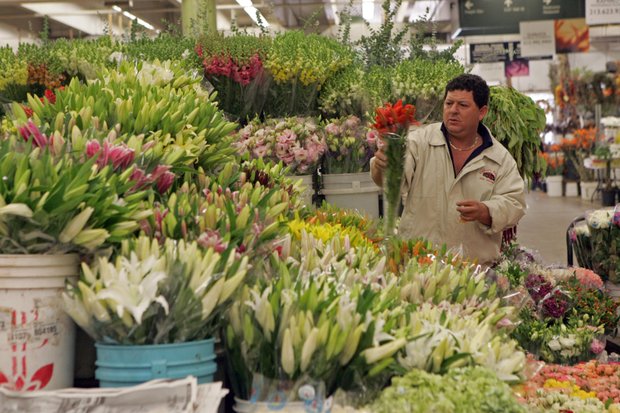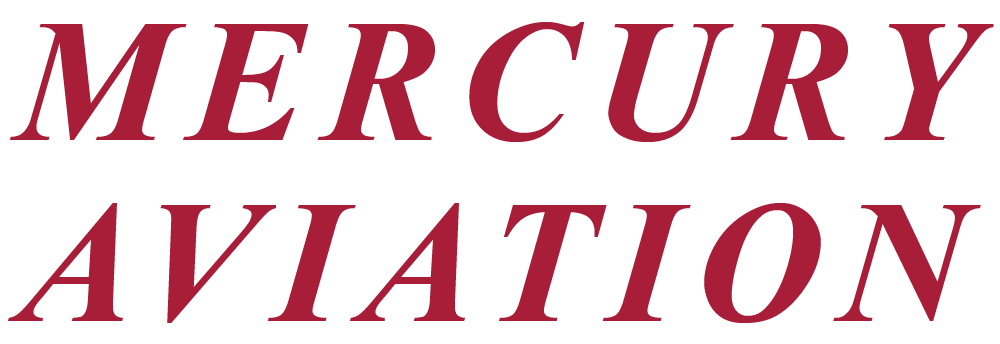Flower Power
Flower Power
By David Haldane, Los Angeles Business Journal
Monday, November 22, 2010

Photo by Ringo Chiu
A vendor with his wares at the flower district in downtown Los Angeles.
Most of the fresh roses that perfume the air in downtown L.A.'s flower district – where local flower vendors converge daily for supplies – take a circuitous route to get there.
They are grown in Colombia and other South American countries, flown to Miami and then driven cross country in refrigerated trucks, sometimes arriving in less-than-pristine condition after 60 hours in transit.
Now, a refrigerated warehouse built by a local logistics company at Los Angeles International Airport is helping flowers arrive faster and fresher, receiving them after seven-hour direct flights from Bogota, Colombia, and other South American locations.
Since the warehouse opened 19 months ago, LAX has seen a 20 percent increase in direct imports from South America – and is threatening to take some of the bloom off Miami's role as the leading gateway city for flowers from Latin America.
"Flowers started coming into LAX more than a decade ago, but not in large numbers. And since then, several other cities – including St. Louis, Dallas and Houston – have unsuccessfully tried to become hubs," said Peter Moran, chief executive of the Society of American Florists, a national trade association based in Alexandria, Va. "I think it makes sense to make Los Angeles more of a hub for flowers."
But Los Angeles has a long way to go.
About 65 percent of the estimated $34 billion in flowers sold in the United States annually come from abroad, mostly from Ecuador and Colombia, with more than 80 percent entering by air through Miami, according to industry analysts.
However, the $1 million, 12,700-square-foot warehouse built by Mercury Air Cargo Inc., an L.A. logistics company based near LAX, has had an immediate impact.
The warehouse added about 15 percent to the refrigerated storage capacity in and around the airport, according to Mercury Air, and is handling about 50 percent more than it did last year.
The airport saw the value of floral imports arriving at LAX rise by nearly $11 million to $62.2 million in the fiscal year ended June 30, when some 7.5 million stems were handled by Mercury Air and several competitors.
Some of those flowers are sold by wholesalers in downtown's flower district but the majority are warehoused until they are loaded onto flights to Tokyo and other Asian cities.
In fact, Mercury Air's larger aim is to handle a bigger share of the flowers exported to Asia from Latin America. Currently, most of those flowers are flown to Europe before reaching Tokyo and other Pacific Rim cities. Some also are handled by Miami-based brokers.
"This will bring more and more business to L.A.," said Ivo Skorin, general manager of Apollo Freight, the Mercury Air division that handles flowers.
Cool space
Mercury Air has some reason to be optimistic.
It decided to build the refrigeration unit after securing a lease from airport operator Los Angeles World Airports and an agreement with Chilean airline LAN Cargo to deliver and warehouse 8,500 tons of perishable products annually from South America. LAN Cargo, which also flies to Miami, will fly in fruits and vegetables in addition to flowers.
The LAX warehouse was built on the edge of the tarmac, allowing cargo planes to taxi directly up to the facility. It is the only logistics company with a refrigerated warehouse on airport property.
A major competitor, Gourmet Logistics, for example, operates a 45,000-square-foot warehouse with 25,000 square feet of refrigerated space but it is several blocks from the airport. Gourmet executives could not be reached for comment.
Victor Abducie, an executive who manages the Mercury Air facility, said the location simplifies the flower transfer process for cargo carriers. The result: fresher flowers with longer shelf lives that command premiums of 10 percent to 15 percent.
Diego Ramirez is a sales representative for FlowerLink, a Hawthorne-based flower importer supplied by cargo carriers that use Mercury Air's warehouse. He said direct flights from South America in combination with the warehouse's tarmac-adjacent location means that the flowers don't have to be taken in and out of refrigeration as much.
"We're handling products in a better way. We're maintaining a better cold chain, which increases turnover and creates more demand. It's definitely made a difference and our volumes have gone up," said Ramirez, who estimated sales have increased 20 percent as a result.
Profile boost?
Mark Thorpe, the director of air service marketing at LAX, said that the Mercury Air warehouse and the company's deal with LAN Cargo will help raise L.A.'s profile as an Asian gateway for South American flower growers.
"There's not an aircraft today with the range to fly directly from Latin America to Asia," Thorpe said. "With so much demand for flowers and other perishables in Asia, LAN looked at Los Angeles as a major gateway."
Still it's questionable how much business Los Angeles can gather, since South American growers and shippers do not deal directly much with Southern California.
In the 12 months ended June 30, 2009, 123 million flower stems were flown into Miami, about 16 times the number handled at LAX, according to airport statistics.
Christine Boldt, executive vice president of the Miami-based Association of Floral Importers of Florida, said that the city has built up a huge industry to handle South American flower imports.
"Lots of other airports have tried to take business away from Miami and all of them have failed," she said. "Miami didn't get this way overnight. It takes lots of time to create the infrastructure necessary to move the product. We don't see L.A. as a threat."
Michael Webber, president of Webber Air Cargo, an Overland Park, Kan., consultancy, agreed that Los Angeles may want to set its sights lower.
"You have a whole bunch of cities out there trying to be alternatives to Miami for cut flowers and most of them don't make any sense at all. Nobody is going to take out the guy with 80-plus percent of the market share." he said. "Miami will always be the dominant route from Latin America, but LAX can increase its share. The important thing is that the level of expectations not be unrealistic."
A Global Leader in Aviation Services
Mercury Aviation has been providing services to the aviation industry and the U.S. Government for more than 60 years. We believe that our team is the best, and so is our offering. Please let us know how we can meet your aviation needs.
Contact UsContact Us
Mercury Aviation Companies LLC
Corporate Headquarters
2780 Skypark Dr
Torrance, CA 90505
Phone: (310) 827-2737
Fax: (310) 827-6897
Send Us A Message.
Terms of Use • Privacy Policy
© Mercury Aviation Companies LLC
All Rights Reserved

